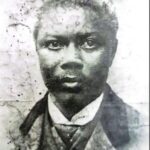MANSA KAMA
- 2 Min Read
Mansa Kama, who lived from about the mid-16th to the 17th century, was a great warrior and one of the earliest Koranko migrants from the present-day republic of Guinea to the hinterland of Sierra Leone.
He founded the settlement of Kamadugu, part of the present Sengbe chiefdom and also ruled over Kholifa country, now part of the Tonkolili district.
He is said to be descended from Sundiata Keita, ruler of medieval Mali in central West Africa, and was a member of the Kagbo (another name for Keita) clan. His real name is believed to have been Yira, but because he was a great hunter and killed many elephants, he was called ‘kama’ meaning ‘elephant.’
Towards the end of the 16th century, Mansa Kama moved into the Sierra Leone hinterland from Sankaran country in Guinea in the company of the alfa (Islamic scholar, charm-maker, and teacher) of the Sesay clan. For the first part of his journey he was with Mansa Morifing, the leader of the first Koranko migrants, and stayed with him at Morifindugu before moving on southwards with Morifing’s blessings. His next stop was close to the Rokel River where he founded a settlement, Kamadugu, named after him.
By the end of the 16th century Mansa Kama had fought his way from Kamadugu to the coast. He finally made a new base at Rowala, the center of Kholifa country, and stayed there to become ruler of the territory which remained in Koranko hands until it was taken over by the Temne about the 19th century.
He is said to have returned periodically to Kamadugu, his original country, where he had left his son Momori Kalko as ruler. The oldest town in Kamadugu was called Kalkoya after him and still bears this name.
When Mansa Kama died he was buried at Rowala where he left all his charms and his regalia of office. The name Mansa Kama then became the title for the ruler of Kholifa and has been retained by the Temne to the present day.
He is still remembered in both Koranko and Temne traditions as the great founding father of Kholifa and Kamadugu countries.
C. MAGBAILY FYLE



